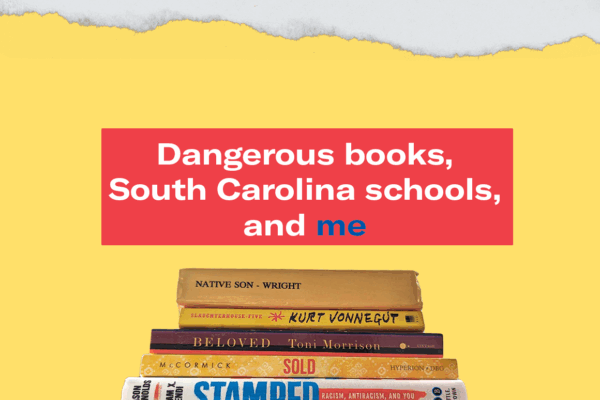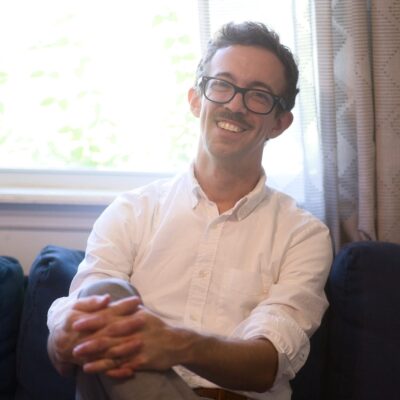Let me tell you about a book they’re trying to ban in South Carolina schools right now.
The book is Slaughterhouse-Five by Kurt Vonnegut, a counterculture classic that nervous parents and modern McCarthyites have been trying to hide from children since its publication in 1969.
In the last three years, Slaughterhouse-Five has been challenged in the Spartanburg 1, Spartanburg 6, and Berkeley County school districts. It is currently on the chopping block along with 159 other titles in Dorchester School District 2, the public school system where I grew up. I’ll be at the next school board meeting Monday night asking the board to reject this politically motivated purge.
The first time I read Slaughterhouse-Five was in 2005, near the end of my 10th grade year at Summerville High School. My English teacher Ms. Abrahamson, a winsome free spirit, had a tradition of assigning a unique book to each student in the final months of the school year. Our assignment was to read the book and give an honest review.
At the time I received this assignment, I was a 16-year-old Southern Baptist youth group kid who listened to Rush Limbaugh and Michael Graham on talk radio. The book seemed custom-made to infuriate a young conservative like me. It was a psychedelic sci-fi novel about a time-traveling soldier who bore witness to the firebombing of Dresden, with detours in a human zoo run by aliens (and a brief stop at a military base in South Carolina, which I pictured in my mind as Fort Jackson). In his sardonic, freewheeling style, Vonnegut skewered organized religion, excoriated politicians who glorify war, and generally barbecued every cow I held sacred. I bristled as I read, until I broke down and laughed.
I had no idea that Slaughterhouse-Five was considered controversial beyond my classroom walls. I didn’t know it was a frequent flyer on the American Library Association’s annual list of most-challenged books, or that it played a role in the 1982 U.S. Supreme Court decision Island Trees v. Pico. In that landmark case about school censorship, the court ruled:
"[L]ocal school boards may not remove books from school library shelves simply because they dislike the ideas contained in those books and seek by their removal to 'prescribe what shall be orthodox in politics, nationalism, religion, or other matters of opinion.'"
All I knew in 10th grade was that this book made me think deeply. I was so disarmed by the humane warmth of Vonnegut’s prose, I borrowed every one of his novels from the Dorchester County Library that summer. I devoured them and loved them all, especially Breakfast of Champions and Deadeye Dick. I remained a devout Christian, albeit one with vital new questions to ponder in times of prayer.
Kurt Vonnegut died on April 11, 2007, in the same week that my dad’s textile mill employer announced mass layoffs. Five days later, a shooter went on a killing spree at Virginia Tech, killing 32 people and wounding 17.
I was a high school senior bound for the University of South Carolina. The world looked wide-open, and not in a good way.
In the month after Vonnegut’s death, I found the time to write a short obituary for Vonnegut, who I lovingly called “Uncle Kurt” despite having never met him. Somehow it ran in The Post and Courier.
Reading my own words now among the newspaper clippings my parents saved, I recognize a wide-eyed young man alive to possibility:
Absurd and lonely as the majority of his characters are, we feel as though we’ve known them since they were young — and that’s because we have. They are the lost and wandering souls who never asked to be born in the first place, searching aimlessly for meaning in a postmodern Waste Land. Five days after Vonnegut died, we saw this sort of hopelessness on the campus of Virginia Tech, where a crazed gunman opened fire on students for no apparent reason. Vonnegut witnessed such depravity firsthand as an American soldier cooped up in a slaughterhouse during the firebombing of Dresden, and he continued to see it in the way everyone around him treated each other. As he wrote at the end of Deadeye Dick, “The Dark Ages — they haven’t ended yet” ... I can remember reading Slaughterhouse-Five in the tenth grade and growing agitated as the narrator repeated, “So it goes,” following every mention of human death. I read Cat’s Cradle and cringed while I snickered as he belittled organized religion with the fabrication of “Bokononism.” He made me think. But he did not dismantle my faith. To the contrary, his acerbic criticism has made it stronger, and my words and actions are largely in response to the questions of human worth and spirituality that he so skillfully brought to the table.
(The stilted book-report prose is all my own doing. The openhearted stance toward the world, I owe to my parents. Make of the rest what you will.)
As we wade into another year of book bans, gag orders, and scare tactics from teacher harassment organizations like Moms for Liberty, our state is in dire need of teachers. There are myriad reasons for the teacher shortage, but the simple math is that they’re quitting faster than our schools can hire new ones. I worry about my own kids’ education, and I’ll do anything to relieve the ever-growing burden of their teachers — including going to bat for them at school board meetings.
When I think about the educators who taught me as a young man, I realize I had an embarrassment of riches.
For Statistics I had Mr. Brinson, who left a more lucrative career in private industry to teach teenagers about sample size and linear regression. For Biology I had Ms. Jackson, who patiently fielded my questions about fossil stratification and never belittled my beliefs as a young-earth creationist (another story for another day).
I sometimes joke with my friends about the whiplash we felt taking U.S. Government from a Ron Paul libertarian and U.S. History from a teacher who assigned passages out of A People’s History of the United States. Everybody went into the classroom with preconceived notions, students included. One of the great gifts that my public schooling gave me was the chance to engage with a wide range of viewpoints, some diametrically opposed to my own.
In the years since I graduated from Summerville High School, I have changed my worldview bit by bit. In some ways I am still the same contrarian dreamer I was back then. I am grateful for teachers who helped us wrestle with the facts and make up our own minds about what they meant. But as the wave of coordinated censorship moves across the state’s schools and libraries, I worry that my own children won’t have the same opportunities.
The Dark Ages — have they ended yet?
For a list of all 160 books being challenged in Dorchester 2 schools, see our press release. If you would like to join the fight against book bans, please join our statewide coalition, Freedom to Read SC.


